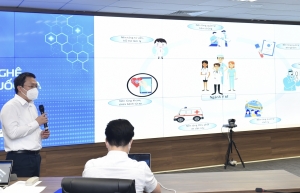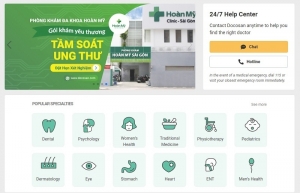Healthcare pros call for legal advances in telehealth
VMED Group, one of the pioneers in supporting the Ministry of Health’s (MoH) telehealth development scheme for the 2020-2025 period since 2020, is facing challenges in developing solutions for telemedicine activities because of a lack of legal framework.
Thus far, solution providers for telemedicine could only execute trial period based on self-funding, while the sustainability and scaling of the model is limited.
Francis Tuan Anh, VMED Group technology advisor told VIR, “We are finding it hard to continue our business in this way. Telemedicine is the combination of protocol treatment and legal documentation, and is required for advanced digital healthcare architecture. We are waiting for the full legal framework to make the next step.”
 |
| Telehealth services skyrocketed in popularity at the onset of the COVID-19 pandemic, Photo: Shutterstock |
Hospitals have also raised the legal issues for months. Dr. Vu Van Giap, director of Training at the Healthcare Activities Centre in Bach Mai Hospital, said a legal framework is crucial to promote telehealth performance at health facilities and to benefit patients.
“For instance, for telehealth performance between central level and local-level hospitals, it is necessary to determine who is responsible for this, the legality of prescription, and how social and health insurance pay for this activity,” he explained.
Dao Xuan Thanh, deputy director of Hanoi Medical University Hospital, added, “We need the MoH’s directions on the financial mechanism, including payments for doctors who take part in remote consultations to facilitate future activities.”
At a meeting held on August 9 by the National Assembly Committee on Social Affairs, telehealth was once again a top issue. Participants urged full facilitation for the amendment of the Law on Medical Examination and Treatment.
Nguyen Thuy Anh, chairwoman of the committee, admitted that telehealth is just sparely regulated in one article in the amended law without clearly regulating some important issues of concerns such as the conditions of performance, the list of diseases subject to telehealth performance, the legal responsibility and requirements of professional skills, prescriptions, and service payment mechanisms.
The amended law is expected to be discussed and adopted at the fourth session of the National Assembly in October and Novermber.
Regarding possible incidents in telehealth performance, Dr. Pham Thi Bich Dao from Hanoi Medical University Hospital, said, “There should be strict regulations. For example, doctors who join telehealth activities must have medical practice certificates in correlative fields. And how to deal with incidents should be specifically regulated to ensure safety and benefits for patients.”
In June 2020, the MoH’s approval of the telehealth development scheme for 2020-2025 marked an important milestone in the healthcare sector towards developing a high-tech-driven healthcare system. By September, 1,000 healthcare facilities had been equipped with telehealth centres.
At that time, with COVID-19 wreaking havoc, telehealth strongly contributed to pandemic control, while many medtech firms joined the playground to support the industry effort.
In the IT health market, Viettel Solutions and VMED are the key players while others include FPT Healthcare and Isofh. Viettel supports hundreds of hospitals to develop their telehealth system, while VMED Group pioneers in innovative integrated medical-tech solutions to drive healthcare transformation and improve treatment quality and efficacy. VMED’s tele-ICU also connects Bach Mai Hospital with Yen Bai Hospital and Hung Vuong General Hospital, ensuring uninterrupted treatment for patients.
As of early 2021, 26 central hospitals had opened a telehealth system, making up 81 per cent of the total, and connecting with more than 1,200 local hospitals. At present, all hospitals nationwide deploy IT in hospital management while personal health records are being compiled into databases for smart preventive treatment and management.
 | Keysight Technologies drives telehealth growth Technology plays a critical role in driving the growth of telehealth, supporting remote and real-time healthcare with videoconferencing and remote patient monitoring. Ee Huei Sin, vice president, Keysight Technologies’ General Electronic Measurement Solutions, discussed with VIR’s Bich Thuy future trends of telehealth and how wireless 5G advance the field. |
 | Vietnamese healthcare marks important digital milestone of 1,000 telehealth facilities The Ministry of Health on September 25 announced the launch of 1,000 healthcare facilities equipped with telehealth centres, marking an important milestone in the sector’s digital transformation path. |
 | Telehealth advances continue in stringent legal framework Hospitals and medtech businesses are expected to benefit more as the legal framework on telehealth is being completed, pinning high hopes to increase access to high-quality healthcare for citizens and adding to the overall value of the sector. |
 | Vietnam launches Telehealth platform connecting all district health facilities Vietnam on August 8 announced the launch of the Telehealth platform connecting to 100 per cent of district-level health facilities to facilitate people in accessing healthcare, especially during COVID-19. |
 | Rise of vital telehealth services providing much-needed access Telehealth startups are popping up more than ever before, aiming to innovate the healthcare sector and cater to the huge demand. |
What the stars mean:
★ Poor ★ ★ Promising ★★★ Good ★★★★ Very good ★★★★★ Exceptional
Themes: Healthcare Platform
- Opella and Long Chau join forces to enhance digestive and bone health
- Hanoi intensifies airport monitoring amid Nipah disease risks
- Cosmetics rules set for overhaul under draft decree
- Policy obstacles being addressed in drug licensing and renewal
- Sanofi, Long Chau Pharmacy relaunch medicine blister pack collection initiative
Related Contents
Latest News
More News
- Vietnam enters new development era: Russian scholar (January 25, 2026 | 10:08)
- 14th National Party Congress marks new era, expands Vietnam’s global role: Australian scholar (January 25, 2026 | 09:54)
- French Communist Party highlights 14th National Party Congress as strategic milestone (January 23, 2026 | 09:19)
- Leaders must rediscover discipline of engagement (January 22, 2026 | 11:08)
- IP alterations shape asset strategies for local investors (January 22, 2026 | 10:00)
- 14th National Party Congress: Vietnam - positive factor for peace, sustainable development (January 22, 2026 | 09:46)
- Japanese legislator confident in CPV's role in advancing Vietnam’s growth (January 22, 2026 | 09:30)
- 14th National Party Congress: France-based scholar singles out institutional reform as key breakthrough (January 21, 2026 | 09:59)
- 14th National Party Congress: Promoting OV's role in driving sustainable development (January 20, 2026 | 09:31)
- 14th National Party Congress affirms Party’s leadership role, Vietnam’s right to self-determined development (January 20, 2026 | 09:27)

 Tag:
Tag:




















 Mobile Version
Mobile Version